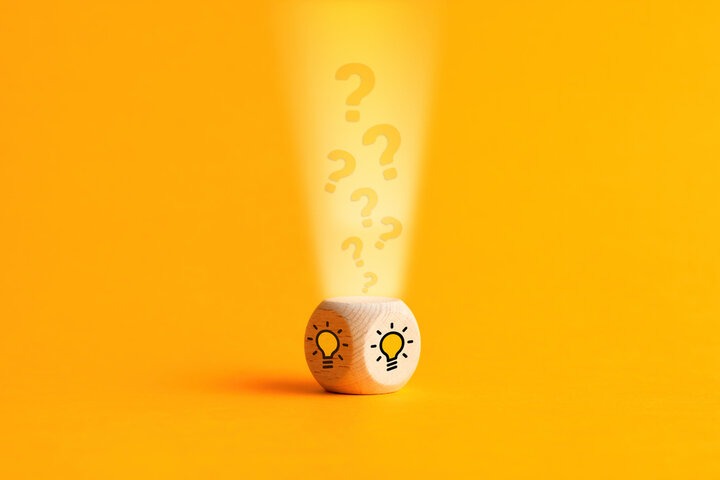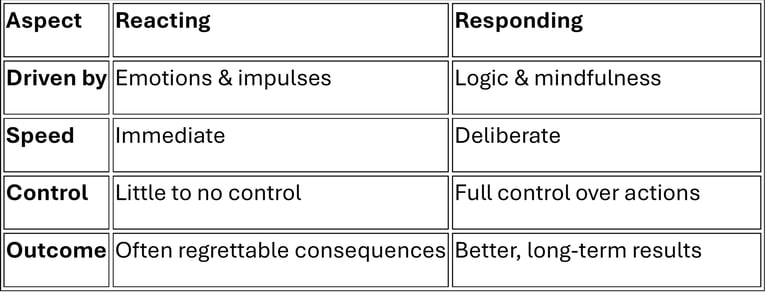Respond vs React: The Psychology Behind Better Decision-Making
PERSONAL DEVELOPMENT
Tarun Mehta
3/21/20253 min read


Respond vs. React: The Psychology Behind Better Decision-Making
Introduction
In our fast-paced world, decisions are often made in the heat of the moment. Whether in personal relationships, professional settings, or even online interactions, we frequently face situations that provoke emotional responses. However, there is a significant difference between reacting impulsively and responding thoughtfully. Understanding this distinction can lead to better decision-making, improved relationships, and overall personal growth.
At the core of this difference lies the way our brain processes information. While reacting is driven by instinct and immediate emotion, responding involves conscious thought and self-control. This article explores the psychological mechanisms behind these behaviors, their real-world applications, and strategies to cultivate a more mindful approach to decision-making.
The Science Behind Reacting
Reacting is an instinctual response that occurs almost instantaneously. It is driven by the amygdala, the part of our brain, which drives processing of the emotions and triggering the fight-or-flight response. This mechanism is crucial for survival, allowing us to respond quickly to danger. However, in non-threatening situations, reacting without thinking can lead to unintended consequences.
For instance, imagine receiving a critical email from your boss. A reaction might involve immediately replying with frustration or defensiveness, potentially damaging your professional reputation. In personal relationships, reacting emotionally during an argument can escalate conflicts rather than resolve them.
Pros of Reacting:
Quick response in emergencies
Instinctive and natural
Can be effective in high-pressure situations.
Cons of Reacting:
Often driven by emotion rather than logic
Can lead to regret and misunderstandings.
Lacks control and deliberation.
The Science Behind Responding
Unlike reacting, responding is a more deliberate and thoughtful process. It engages the prefrontal cortex, the part of our brain driving rational thinking, decision-making, and impulse control. Responding requires pausing, analyzing the situation, and choosing the most appropriate course of action.
When faced with the same critical email from a boss, responding would involve taking a moment to assess the feedback, considering the intent behind it, and crafting a professional and constructive reply. In relationships, responding thoughtfully during conflicts can lead to open discussions and stronger connections.
Pros of Responding:
Encourages logical and mindful decision-making.
Helps maintain control over emotions.
Leads to better long-term outcomes.
Cons of Responding:
Requires effort and self-awareness.
Can take longer to implement.
May be challenging in high-stress situations.
Key Differences Between Responding and Reacting
The table above highlights the fundamental differences between reacting and responding. While reacting may seem natural, it often leads to negative outcomes. On the other hand, responding requires a conscious effort but results in more constructive and beneficial resolutions.
Real-World Applications
1. Workplace Conflicts
In professional environments, conflicts and high-pressure situations are common. Reacting impulsively to criticism or disagreements can harm relationships and damage reputations. Instead, responding thoughtfully—by listening actively, acknowledging different perspectives, and offering solutions—fosters a more productive work environment.
2. Personal Relationships
Emotional reactions in relationships can cause unnecessary misunderstandings. For example, reacting defensively to a partner’s concerns might escalate a disagreement. Responding, however, involves active listening, empathy, and finding common ground, ultimately strengthening relationships.
3. Social Media & Online Debates
The digital age has amplified impulsive reactions, especially on social media. Quick, emotionally driven responses to controversial topics can lead to unnecessary conflicts. A more mindful approach—pausing before commenting, verifying information, and considering alternative viewpoints—promotes healthier online interactions.
How to Shift from Reacting to Responding
Transitioning from reacting to responding requires conscious effort and practice. Here are some effective strategies:
1. Pause and Breathe
Before responding to any situation, take a deep breath. This brief pause allows your brain to shift from an emotional reaction to a logical response.
2. Ask Yourself the Right Questions
Before acting, consider:
“Will this reaction serve me in the long run?”
“Am I responding based on facts or emotions?”
“What is the best way to handle this situation?”
3. Practice Mindfulness
Mindfulness techniques, like meditation and journaling, help improve self-awareness and emotional regulation. Developing a habit of mindfulness reduces impulsivity and promotes thoughtful responses.
4. Reframe the Situation
Instead of perceiving challenges as personal attacks, view them as learning opportunities. Reframing helps shift the focus from emotional reactions to constructive problem-solving.
5. Delay Responses When Possible
If a situation is emotionally charged, take time before responding. Whether it is a difficult conversation, a critical email, or an online argument, stepping away for a few minutes or even hours can lead to a more thoughtful reply.
Conclusion
The ability to respond rather than react is a powerful skill that can transform personal and professional relationships. While reacting is often instinctive and emotional, responding requires mindfulness, self-awareness, and patience. Understanding the psychological mechanisms behind these behaviors helps us make better decisions and foster healthier interactions.
Incorporating strategies like pausing, reframing, and mindfulness can shift our approach to decision-making, leading to improved outcomes. Next time you face a challenging situation, take a moment to respond thoughtfully rather than react impulsively. The difference can be life-changing.
Would you like to challenge yourself? For the next week, consciously practice responding instead of reacting and observe how it impacts your interactions. You will be impressed by the beneficial impact this will have on your relationships and results.
Video available at: https://youtu.be/ZCKqaDPxsyA



Ascend2Elevate
Transform today, Thrive tomorrow
© 2026. All rights reserved.
PS: The content on the website are the author's viewpoint and opinion. Kindly follow any tips or advice at your own discretion and ensure they suit your needs and personal situation. Please check our T&C page for more details (ascend2elevate.com.au/terms-and-conditions)
Office 4074, Ground Floor, 470, St Kilda Rd, Melbourne, VIC-3004, Australia
